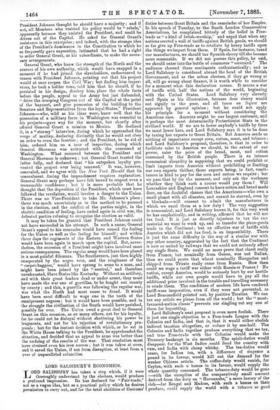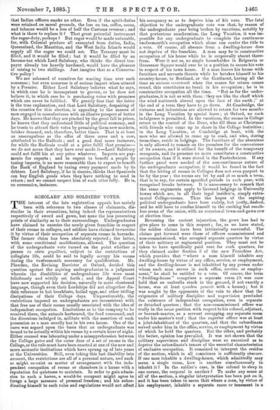LORD SALISBURY'S ECONOMICS.
T,ORD SALISBURY has taken a step which, if it were thoroughly understood by the electors, would produce a profound impression. He has declared for "Fair-trade," not as a vague idea, but as a practical policy which he desires permission to carry out, and for the total abolition of Customs'
duties between Great Britain and the remainder of her Empire. In his speech of Tuesday, to the South London Conservative Associations, he complained bitterly of the belief in Free- trade as " a kind of fetish-worship," and urged that when any nations erected a wall of tariffs against British goods, we should so far give up Free-trade as to retaliate by heavy tariffs upon the things we import from them. If Spain, for instance, taxed our manufactures, we should tax Spanish sherry till she became more reasonable. If we did not pursue this policy, he said, we should enter into the battle of commerce "unarmed." The audience cheered these sentiments enthusiastically ; and as Lord Salisbury is considered abroad the head of the British Government, and as the urban electors, if they go wrong at all, will go wrong about finance, it is worth while to consider for a moment what this declaration means. It means a war of tariffs with half the nations of the world, beginning with the United States. Lord Salisbury very cleverly used Spain as his illustration, because dear sherry would not signify to the poor, and all taxes on liquor are approved by general opinion ; but he could not apply his principle for a moment without considering the American case. America might be our largest customer, and is perhaps the most determinedly Protectionist State in the civilised world. If we are to lower anybody's tariffs by force we must lower hers, and Lord Salisbury says it is to be done by taxing her exports to Great Britain. But America sends us nothing of importance except corn, cotton, meat, and tobacco ; and Lord Salisbury's proposal, therefore, is that in order to facilitate sales to America we should, to the extent of our power, raise the price of the bread, meat, and cotton consumed by the British people. There is an intense economical absurdity in supposing that we could prohibit or limit imports from America without prohibiting or limiting our own exports thither, those exports being, in fact, remit- tances in kind to pay for the corn and cotton we require ; but we pass that by for the moment, and only ask the workmen whether they think such a course would pay them ? Will Lancashire and England consent to have cotton and bread made dear, on the doubtful chance that the Americans—who own a small planet with all climates, and cannot be starved, even by a blockade—will consent to admit the manufactures in which we excel them at a low duty ? The very suggestion is nonsensical, and Lord Salisbury knows it, for this very week he has emphatically, and in writing, affirmed that he will not tax food. It is just as directly injurious to tax the raw material we want to work up, and so transfer the piece-goods trade to the Continent ; but an effective war of tariffs with America which did not tax food, is an impossibility. There is just the same difficulty in the way of a similar war with any other country, aggravated by the fact that the Continent is now so united by railways that we could not seriously affect any single State. We could no more prove that claret really from France, but nominally from Genoa, was not Italian, than we could prove that wheat nominally Hungarian and shipped from Trieste really came from Russia. How then could we wage a tariff war either with Russia or France ? No nation, except America, would be seriously hurt by our hostile tariffs, while our own people would have to pay all the additional price involved in the trouble and travelling necessary to evade them. The conditions of modern life have rendered tariff-wars inoperative, even if they were not prevented, as Lord Beaconsfield pointed oat, by positive Treaties. We can tax any article we please from all the world ; but the " most- favoured-nation clause " prevents our singling out any one of them for boycotting. Lord Salisbury's next proposal is even more foolish. There is just one single objection to a Free-trade League with the Colonies and India, and that is, that it would either abolish indirect taxation altogether, or reduce it by one-half. The Colonies and India together produce everything that we tax, and true Free-trade with the Colonies would make the Treasury bankrupt in six months. The spirit-duties would disappear, for the West Indies .could flood the country with rum, and India with cheap whisky. The tea-duties would cease, for Indian tea, with a difference of sixpence a pound in its favour, would kill out the demand for the weaker Chinese article. The coffee-duty would vanish, for Ceylon, with such a bonus in its favour, would supply the whole quantity consumed. The tobacco-duty would be gone —with the exception of the comparatively small amount derived from the duty on " Havannahs," a mere luxury of the rich—for Bengal and Madras, with such a bonus on their produce, could supply the world with a tobacco so good that Indian officers smoke no other. Even if the spirit-duties were retained on moral grounds, the loss on tea, coffee, cocoa, and tobacco would be a loss of half the Customs revenue ; and what is there to replace it I That great potential instrument the sugar-duty, perhaps I But sugar would be made untaxable, for, with Colonial produce all exempted from duties, India, Queensland, the Mauritius, and the West India Islands would supply all the sugar we could eat. The Treasury must be filled, and it would be filled ; but it would be filled by an Income-tax which Lord Salisbury, who thinks the direct tax- payer already too heavily burdened, would have the pleasure of raising to two shillings. Just imagine that as a Conserva- tive policy !
We are ashamed of ourselves for wasting time over such nonsense ; but even nonsense is of serious import when uttered by a Premier. Either Lord Salisbury believes what he says, in which case he is incompetent to govern, or he does not believe it, in which case he is purchasing votes with promises which can never be fulfilled. We greatly fear that the latter is the true explanation, and that Lord Salisbury, despairing of the counties for this election, is appealing to the masses of men engaged in manufactures with an illusive prospect of better days. He knows that they are pinched by the great fall in prices, he knows that they understand little of political economy, and he trusts to attract their votes by promising them new markets, brisker demand, and, therefore, better times. That is at least as unscrupulous as the offer of three acres and a cow, attributed to the Radicals ; and a good deal more insincere, for while the Radicals could at a price fulfil that promise— we do not mean that they have ever made it—Lord Salisbury could not fulfil his at any price whatever. Imports are pay- ments for exports ; and to expect to benefit a people by taxing imports, is no more reasonable than to expect to benefit the Bank of England by taxing every payment made by its debtors. Lord Salisbury, if he is sincere, thinks that Spaniards can buy English goods when they have nothing to send in return ; and we cannot suspect him of such utter folly. He is, on economics, insincere.















































 Previous page
Previous page